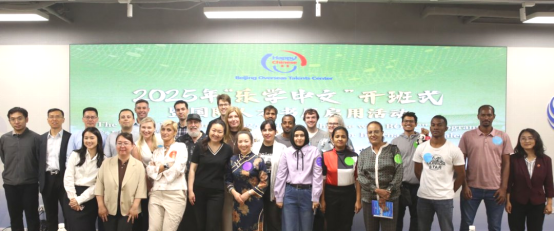On May 16, the “2025 Happy Chinese with BOTC” program was launched in the Zhongguancun International Talents Service Area. Over 50 foreign experts and friends living in Beijing from countries including the United Kingdom, the United States, Australia, and Pakistan participated in the event.

Co-organized by the Office of Foreign Affairs Committee of the CPC Beijing Municipal Committee and Foreign Affairs Office of the People’s Government of Beijing Municipality, and the Beijing Overseas Talents Center, the “Happy Chinese with BOTC” program marks a concrete measure to implement the Regulations of Beijing Municipality on Improving Language Environment for International Exchanges (hereinafter referred to as “the Regulations”) and optimize the language environment for international exchanges in a multi-dimensional way. The project aimed at encouraging foreign nationals in Beijing to embark on a journey of cultural exploration by learning Chinese, and attracting more foreign nationals to follow and support Beijing’s development.
At the launch event, foreign participants shared their experience on learning Chinese and joining cultural activities. On top of learning Chinese, Suwankiri Puttachat from Tsinghua University said he also attended activities to make mooncake and zongzi, and learn calligraphy, therefore gaining a deeper understanding of Chinese culture. Lincoln Brooke Humphries from China Media Group expressed his hope to deepen understanding of Beijing through systematic Chinese learning.
The representative from the Beijing Foreign Affairs Office briefed the participants on the latest progress on using foreign languages in public services, and sent them bilingual Handbook on Beijing’s Foreign Language Facilitation in Public Services as gifts. During the event, the foreign language facilitation measures taken in Beijing’s government services, transportation, medical care, tourism and other fields were spoken highly of by the foreign participants, as both their work and life have benefited significantly, and their sense of belonging has been boosted as well. The recent years have seen better foreign language services in Beijing, as the public service hotline 12345, multi-language telephone interpreting service, and the English map released recently have helped to resolve a multitude of practical problems, as introduced by Radosavljevic Gaberova Natasa, a Serbian teacher from Beijing Foreign Studies University.
Moving forward, Beijing Foreign Affairs Office will continue to implement the Regulations to translate more facilitation measures into reality, creating a better international environment for foreign nationals in Beijing.


